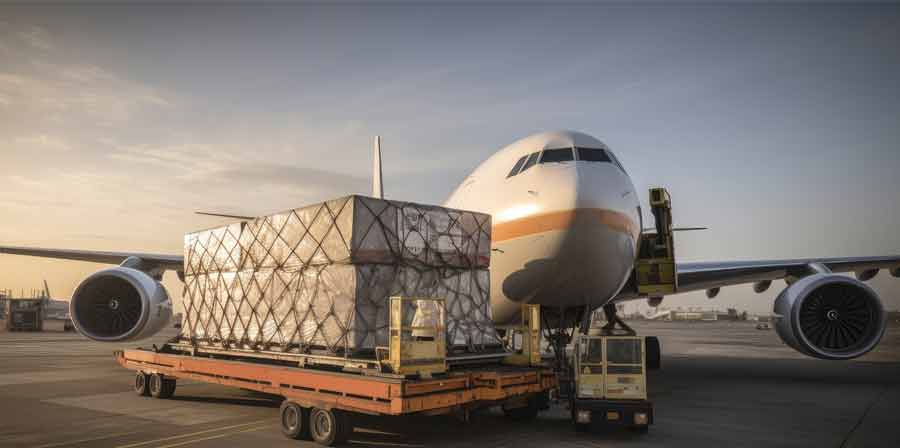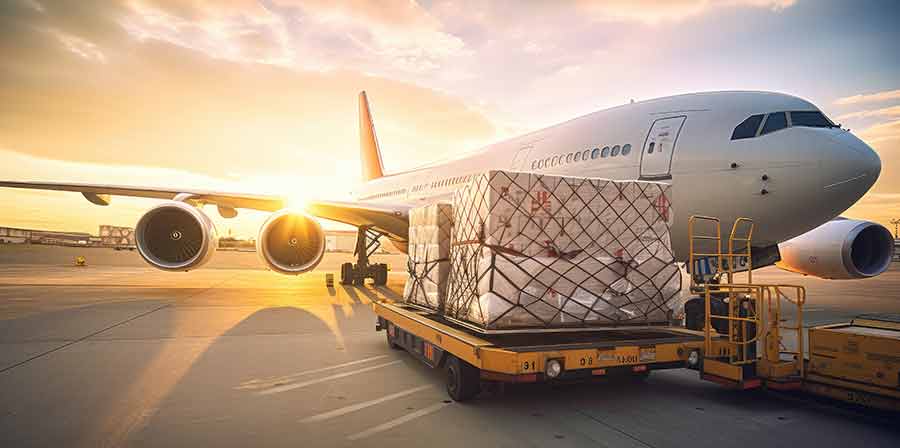Welcome to the fast-paced world of 2024, where 'international air freight rates rising' is more than just a buzz phrase – it's the reality that's reshaping the shipping landscape. In this comprehensive article, we delve into the reasons behind this trend, examining the delicate interplay between air and ocean freight, and revealing how Jillamy's expert strategies are navigating shippers through these complex times. Prepare to gain insightful knowledge, not only about the factors driving the surge in rates, but also about the innovative ways technology and astute logistics management are turning these challenges into opportunities for businesses worldwide.
Understanding The Recent Surge in Air Freight Rates
In recent weeks, the logistics industry has observed a notable surge in air freight rates, a challenging development for freight shippers around the globe. The fundamental cause? A significant shift in shipping preferences due to prolonged delays in ocean freight – a repercussion of delays from container ships avoiding the Red Sea and issues from drought-related capacity constraints in the Panama Canal.
As major shipping lanes face bottlenecks and disruptions, an increasing number of shippers are turning to air freight to avoid these delays. The consequence of this pivot is straightforward yet impactful: heightened demand leads to escalating prices in the air freight sector. CNBC reported on the rising air freight rates and noted that one of the world’s major apparel routes from Vietnam to Europe saw volume rise by 62% in a week.
However, the narrative around air freight rates is not one-dimensional. Experts from knowledgeable sources like AirCargoNews.net still forecast a potential decline in air freight rates in 2024. This expected shift is closely related to the resurgence of belly capacity in commercial air cargo entering back into the marketplace. As passenger flights resume more regular operations, the additional cargo space available in these aircraft could ease some of the pressure on air freight demand as well, potentially leading to more stabilized rates.
For shippers, this scenario presents a complex challenge. The immediate need, or in some cases, the absolute necessity, to opt for air freight due to ocean freight delays comes with a substantial cost. Balancing these escalated costs against the urgency of shipping timelines and supply chain needs is becoming an increasingly common dilemma for companies around the globe.
This intricate dance of demand, supply, and pricing in the air freight market underscores the importance of strategic logistics planning. For businesses navigating these turbulent waters, partnering with seasoned international logistics experts like Jillamy can offer a beacon of clarity and efficiency. Our team’s deep understanding of market trends and nimble approach to logistics solutions provide invaluable guidance in these fluctuating times.
While the air freight market currently experiences a spike in demand and rates, the evolving nature of global trade and transportation suggests a dynamic future. Businesses engaging in international shipping must stay attuned to these shifts, adapting their logistics strategies to ensure resilience and competitiveness in a market characterized by constant change.

Navigating the Currents of International Freight: Jillamy's Expert Strategies
As the logistics landscape continues to evolve in response to the global shipping environment, we're witnessing a ripple effect that's reshaping the strategies of shippers worldwide. "Amidst this dynamic and ever-evolving global freight landscape, we're observing a strategic recalibration as shippers increasingly pivot to air freight solutions. This shift, while primarily a response to the pronounced delays in ocean transport, also represents a nuanced understanding of the global supply chain intricacies," says Chris Gordon, Jillamy's Director of International Sales. "This isn't merely a reactionary measure; it's a sophisticated strategy to maintain supply chain fluidity. To maintain agility and foresight in these decisions, it's about striking a balance that weighs the immediacy of air freight against its costs, while also planning for the longer-term implications of these market dynamics. Our role is to navigate these complexities, ensuring that our clients not only overcome current challenges but also emerge with more resilient and adaptive logistics strategies."
This trend underscores a broader narrative: the interconnectedness of different modes of transport and the cascading impact that disruptions in one area can have on another. Our recent article provides a detailed breakdown of the current challenges in global ocean freight and container shipping. As ocean freight faces major delays, air freight emerges as the stopgap solution, albeit with its own set of challenges and costs. This interplay between the two modes of transport is a delicate balancing act for shippers, requiring agility and strategic foresight.
To elucidate the current state of international freight shipping, let's distill the complexities into key points, offering a clearer understanding of today's market:
Air Freight Dynamics
- Speed vs. Cost: Air freight offers unparalleled speed but at a premium cost, making it a strategic choice for time-sensitive shipments.
- Market Response: As a direct response to ocean freight delays, air freight has seen an upsurge in demand, impacting availability and pricing.
Ocean Freight Trends
- Economical but Slower: Traditionally more cost-effective, ocean freight is currently experiencing significant delays, affecting supply chain timelines.
- Bulk Transport Viability: Ideal for larger, less time-sensitive shipments, ocean freight remains a staple for bulk transport despite current challenges.
Strategic Balance in Freight Choices
- Hybrid Shipping Strategies: Employing a combination of air and ocean freight can provide a balanced approach to cost, speed, and volume.
- Contingency Planning: In the face of market volatility, having alternative plans is crucial for maintaining supply chain fluidity.
Jillamy's role in this complex environment is not merely reactive; it is predictive and proactive. Our team of international shipping experts have an in-depth grasp of evolving market dynamics, which they leverage to craft innovative logistics strategies to help any company deftly navigate the complexities of international freight shipping. Our approach is focused on precision and adaptability, offering custom-fit solutions and agile responses to the ever-shifting dynamics of the freight market. The goal is clear: to achieve an optimal balance of cost-effectiveness, timeliness, and customer satisfaction in an unpredictable global landscape.
For businesses looking to stay afloat and thrive in these challenging conditions, the support of a seasoned logistics partner like Jillamy is indispensable. In a landscape where adaptability and strategic foresight are paramount, Jillamy's expertise provides a guiding light, ensuring businesses can navigate these changes effectively and efficiently.
Harnessing Technology in Modern Freight Logistics: Innovations for Efficiency and Cost-Effectiveness
As we navigate through 2024, the integration of technology in freight logistics has transitioned from a luxury to an essential component for success. Jillamy, at the forefront of this evolution, has embraced technological advancements to enhance efficiency and reduce operational costs in the complex world of freight logistics.
-
Advanced Real-Time Tracking
- In an era where information is power, freight shippers should leverage sophisticated real-time tracking systems. This technology enables businesses to monitor their shipments with unparalleled precision, offering transparency and control over their logistics processes. It also helps spot and address supply issues before they have a broader impact on your business.
-
AI-Driven Logistics Planning
- Artificial Intelligence (AI) is becoming an essential tool in logistics planning. Through the crunching of massive data sets, AI algorithms are adept at forecasting possible hiccups, fine-tuning routes, and smoothing out the logistics process, all leading to heightened efficiency and a trimmer bottom line.
-
Data Analytics for Strategic Decision-Making
- Comprehensive data analytics should be used to dissect past trends and forecast future patterns. This approach allows for strategic decision-making, enhancing the ability to adapt to market changes and mitigate risks effectively.
-
Automation and Robotics in Operations
- Embracing automation and robotics will significantly enhance operational speed and accuracy. Integrating these smart solutions doesn't just make processes slicker; it also cuts down on human slip-ups, guaranteeing a more consistent and dependable approach in handling logistics.
-
The Role of IoT in Supply Chain Management
- Utilizing the Internet of Things (IoT) in container shipping plays a crucial role to keep all your goods moving smoothly. By interconnecting various elements of the logistics chain, IoT ensures a cohesive and responsive system, enhancing overall efficiency and responsiveness to market demands.
The adoption and integration of these cutting-edge technologies in freight logistics are helping give more companies the ability to adjust quickly to new challenges and unexpected issues.
Arming your business with these powerful tools and investing in fully utilizing them delivers a significant competitive advantage in a rapidly evolving global market.
"Our role is to navigate these complexities, ensuring that our clients not only overcome current challenges but also emerge with more resilient and adaptive logistics strategies."
Steer Through Ocean and Air Freight Challenges with Jillamy's Expertise
And there we have it, shippers – a whirlwind tour through the dynamic and ever-changing landscape of modern freight logistics and a look at what’s ahead in 2024. It's a world where being quick on your feet (or wheels, or hulls, or wings) is the name of the game.
From the surge in air freight rates to the strategic maneuvers in ocean freight, Jillamy has been guiding shippers through shifting market challenges for decades. Our freight experts tackle the complexities of these interconnected transport modes with finesse on a daily basis. We also offer a host of technology for shippers to leverage like real-time tracking, AI-driven logistics, and a whole suite of digital tools that make managing your shipments as easy as streaming your favorite tune.
But hey, it's not just about navigating these waters; it's about charting a course to success. Jillamy's blend of industry insight, technological innovation, and strategic acumen is your compass to turning logistics challenges into triumphs. Whether it's balancing the cost-speed equation or adapting to market shifts, they've got the expertise to keep your cargo moving smoothly and efficiently.
Join forces with Jillamy as we work to turn logistics challenges into victories for growing companies. Contact the international shipping experts at Jillamy today at 800-592-7449 or let us know what shipping and logistics challenges we can help solve on our contact us page.


